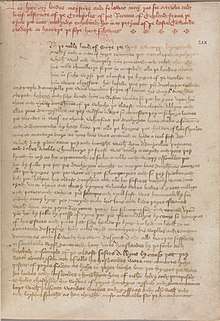John Shirley (scribe)
John Shirley (c. 1366–1456) was an author, translator, and scribe. As a scribe of later Middle English literature, he is particularly known for works by John Lydgate and Geoffrey Chaucer.

Biography
Shirley's career began in the service of Richard Beauchamp, 13th Earl of Warwick. In 1403, Shirley was in Warwick's retinue in the campaign against Owain Glyn Dŵr. In 1414, he collected wages for Warwick's retinue in France and was specified as the earl's secretary in 1420–21.[2] Warwick returned to England between 1428 and 1430 as tutor to Henry VI, from whom Shirley received a new year's gift in 1428. In June 1428, Shirley and other members of the Beauchamp household were admitted to confraternity of St Albans Abbey. In 1432-3, Shirley was Comptroller of Petty Customs in the Port of London[3], and in 1436 he was recorded as having an income of £10 from lands in Hertfordshire.[2]
Between about 1438 and his death Shirley rented four shops from St Bartholomew's Hospital. On the basis of manuscripts copied for Shirley, in his hand, or associated with him, some have speculated that Shirley ran a scriptorium or library from these properties.[2] Shirley both translated works from French and Latin and collected and annotated copies of contemporary vernacular authors, such as Chaucer and Lydgate.[4]
In Shirley's will, he asked to be buried in the lady chapel at St Bartholomew's Hospital, near his mother and first wife, Elizabeth. His second wife, Margaret, survived him. Shirley died on 21 October 1456 and was buried at St Bartholomew's. His epitaph was recorded by the Elizabethan antiquary John Stow, who owned several manuscripts copied by or associated with Shirley.
Manuscripts
The surviving manuscripts associated with Shirley can be categorized into three groups: those in Shirley's own hand, those that he annotated, and those apparently derived from manuscripts probably owned or annotated by him. Examples of Shirley's hand can be found at the digital project, Late Medieval English Scribes.
Manuscripts copied by Shirley or containing substantial items in his hand include the following:
- Cambridge, Trinity College, MS R.3.20
- British Library, Add. MS 16165 and Harley MS 78, folios 80r–83v
- Lambeth Palace Library, MS Arc. L.40.2/E.44 (formerly at Sion College)
- Oxford, Bodleian Library, MS Ashmole 59
- San Marino, Huntington Library, MS EL 26.A.13
Manuscripts annotated by Shirley or containing his distinctive mark of ownership and motto (a crowned A with the words ma ioye) include the following:
- Cambridge, Corpus Christi College, MS 61
- Cambridge, Gonville and Caius College, MS 669*/646
- Cambridge University Library, MS Ff.1.33
- British Library, Royal MS 20 B XV
- London University Library, MS 1
- New Haven, Yale University Library, Osborn a29 and Takamiya MS 16
Manuscripts apparently or possibly derived in part from exemplars written or annotated by Shirley include the following:
- Cambridge, Trinity College, MS R.3.19 and MS R.3.21
- Cambridge, Mass., Harvard University, Houghton Library, MS Eng 530
- British Library, Add. MS 5467, Add. MS 34360, Cotton MS Titus A.xxvi, Harley MS 2251, and Harley MS 7333.
References
- Partridge, Stephen, “The legacy of John Shirley: revisiting Houghton MS Eng 530,” in New Directions in Medieval Manuscript Studies and Reading Practices: Essays in Honour of Derek Pearsall, eds. Kathryn Kerby-Fulton, John J. Thompson, and Sarah Baechle (Notre Dame: University of Notre Dame Press, 2014), 425-445.
- Griffiths, Jeremy (23 September 2004). "Shirley, John (c. 1366–1456), author, translator, and scribe". Oxford Dictionary of National Biography. doi:10.1093/ref:odnb/25428. Retrieved 2020-05-07.
- Great Britain Public Record Office (1907). Calendar of the Patent Rolls Preserved in the Public Record Office: Henry VI: Volume II: AD 1429-1436. London: H.M. Stationery Office. p. 183.
- Connolly, Margaret (31 March 2016). "John Shirley". Oxford Bibliographies. Retrieved 20 May 2020.